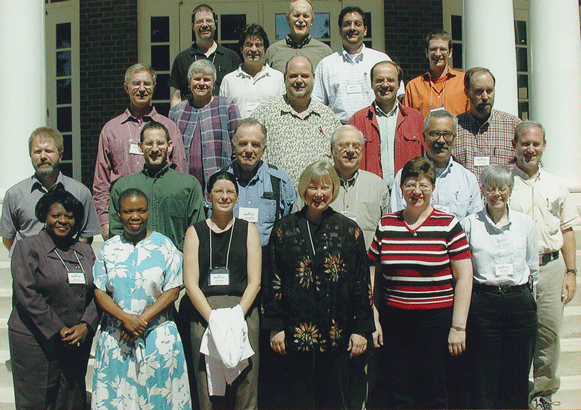2003 Conference on Teaching and Technology
Dates:
September 4-7, 2003 at Wabash College, Crawfordsville, Indiana
The Wabash Center convenes scholars who are theologically, technologically, and pedagogically sophisticated about the wide range of issues surrounding information technology and the teaching of theology and religion. The conference seeks to foster a conversation that will benefit both church and academy. In that light, it requires reflection different from generalized assumptions about cybermedia, information design, communication, and other dimensions of the use of technology in higher education.
Scope of the task:
Engage in discussion about strategies, limitations, and advantages associated with technology in relation to theological teaching. More carefully map the terrain of the cybermedia landscape as it relates to teaching and learning in theology and religion. Discuss the role of the Wabash Center concerning cybermedia for faculty teaching theology and religion. Serve as a place to test potential ideas for demonstration projects developed by conference participants.
Primary goals:
• Assess the fundamental issues concerning the use of information technology in teaching theology and religion from the perspectives of students, faculty, administration, and key external constituents.
• Develop principles for using information technology for teaching in theology and religion that address both the practical needs of good pedagogy and the theoretical needs associated with the various scholarly fields.
• Design demonstration projects to be implemented as a result of the conference that would serve participants’ own institutions and contribute to the learning of the larger academic community.
• Identify ways the Wabash Center can support faculty and schools as they continue to examine and experiment with the use of cybermedia that would (1) enhance teaching and learning in theology and religion and (2) provide guidelines for making decisions about what constitutes good technology-based teaching and learning projects.
Outcomes:
• Identification of the critical assets and limitations of cybermedia in relation to teaching and learning in theology and religion in the next five years based on an holistic analysis of constituent needs, assumptions, expectations, and concerns.
• Generation of principles of technologically-referenced practice that support improved teaching and learning in theology and religion.
• Development of ideas for innovative demonstration projects that expand examples of how technology can be a significant resource for effective teaching and learning and encourage experimentation by seminary and religion department faculties.
• Determine concrete steps the Wabash Center could take in assisting faculty in making good decisions about teaching with technology.
Conveners:
Vic Klimoski, St. John’s University
Dianne Oliver, University of Evansville
Paul O. Myhre, Wabash Center

Front Row (left to right): Mary Young (The Samuel DeWitt Proctor School of Theology), Masego Kebaetse (Eastern Baptist Theological Seminary), Faith Kirkham Hawkins (Candler School of Theology), Mary Hess (Luther Seminary),Dianne Oliver (University of Evansville), Sheila McGinn (John Carroll University).
Second Row: *Paul Myhre (Wabash Center), Sebastian Mahfood (Kenrick-Glennon Seminary), Charles Willard (Association of Theological Schools), Daniel Aleshire (Association of Theological Schools), Jean-Pierre Ruiz (St. John’s University), Robert Royalty (Wabash College).
Third Row: Jim Rafferty (Minnesota Consortium of Theological Schools), Jan Viktora (University of St. Thomas), Steve Delamarter (George Fox Evangelical Seminary), Felix Just (Loyola Marymount University), Richard Nysse (Luther Seminary).
Fourth Row: Wesley Avram (Yale Divinity School), George Kalantzis (Garrett-Evangelical Theological Seminary), Trevor Bechtel (Seabury-Western Theological Seminary).
Fifth Row: A.K.M. Adam (Seabury-Western Theological Seminary), Victor Klimoski (St. John’s University).
* leadership/staff